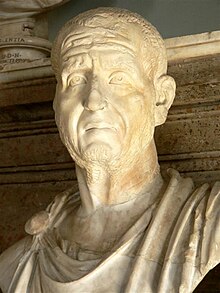Decius
| Decius | |||||
|---|---|---|---|---|---|

Bust of Trajan Decius
|
|||||
| 34th Emperor of the Roman Empire | |||||
| Reign | 249–251 (alone); 251 (with Herennius Etruscus) |
||||
| Predecessor | Philip the Arab | ||||
| Successor | Trebonianus Gallus and Hostilian | ||||
| Born | c. 201 Budalia (Martinci, Serbia) |
||||
| Died | June 251 (aged 50) Abrittus (Razgrad, Bulgaria) |
||||
| Wife | |||||
| Issue | Herennius Etruscus and Hostilian | ||||
|
|||||
| Full name | |
|---|---|
| Gaius Messius Quintus Decius (from birth to accession); Caesar Gaius Messius Quintus Traianus Decius Augustus (as emperor) |
Trajan Decius (Latin: Caesar Gaius Messius Quintus Traianus Decius Augustus; c. 201 – June 251) was Roman Emperor from 249 to 251. In the last year of his reign, he co-ruled with his son Herennius Etruscus until they were both killed in the Battle of Abritus.
Decius, who was born at Budalia, near Sirmium in Pannonia Inferior (now Martinci and Sremska Mitrovica in Serbia), was one of the first among a long succession of future Roman Emperors to originate from the Danube provinces, often simply called Illyricum. Unlike some of his immediate imperial predecessors such as Philip the Arab or Maximinus who did not have extensive administrative experience before assuming the throne, Decius was a distinguished senator who had served as suffect consul in 232, had been governor of Moesia and Germania Inferior soon afterwards, served as governor of Hispania Tarraconensis between 235–238, and was urban prefect of Rome during the early reign of Emperor Philip the Arab (Marcus Iulius Phillippus).
Around 245, Philip I entrusted Decius with an important command on the Danube. By the end of 248 or 249, Decius was sent to quell the revolt of Pacatianus and his troops in Moesia and Pannonia; some modern historians see this rebellion as a reflection of emerging Balkan separatism. After the collapse of the revolt, Decius let the troops proclaim him Emperor. Philip had to advance against him and was killed at Verona, Italy, in September 249. The Senate then recognized Decius as Emperor, giving him the attribute Traianus as a reference to the good emperor Trajan. According to the Byzantine historian Zosimus, Decius was clothed in purple and forced to undertake the [burdens of] government, despite his reluctance and unwillingness.
...
Wikipedia
